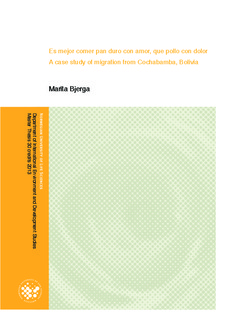| dc.contributor.author | Bjerga, Marita | |
| dc.date.accessioned | 2014-02-13T11:18:25Z | |
| dc.date.available | 2014-02-13T11:18:25Z | |
| dc.date.copyright | 2013 | |
| dc.date.issued | 2014-02-13 | |
| dc.identifier.uri | http://hdl.handle.net/11250/187917 | |
| dc.description.abstract | This study examines the motives people have for migration in Bolivia, how migration affect left behind family members and how migrants and their remaining family maintain relations across borders. The research was conducted using a qualitative approach and it was divided into two parts. Part one included participant observation and non-structured interviews as well as mapping of household and migration stories. Part two involved semi-structured depth interviews.
The study concludes that economic purposes and a wish to improve life conditions for their families are the main motives for migration. Family relations, children’s biography and personality seem to be affected when parents choose to migrate. This paper shows how roles and family structures are rearranged as a consequence of migration. Transnational communication between migrants and left behind families in the area of the study appears to be scarce, mainly due to lack of technical and financial resources, in addition to limited amount of time for communication. The limited communication challenges transnational relations and makes the return and re-integration processes difficult. | no_NO |
| dc.language.iso | eng | no_NO |
| dc.publisher | Norwegian University of Life Sciences, Ås | |
| dc.subject | Migration | no_NO |
| dc.title | Es mejor comer pan duro con amor, que pollo con dolor : a case study of migration from Cochabamba, Bolivia | no_NO |
| dc.type | Master thesis | no_NO |
| dc.subject.nsi | VDP::Social science: 200::Sociology: 220 | no_NO |
| dc.source.pagenumber | 136 | no_NO |
